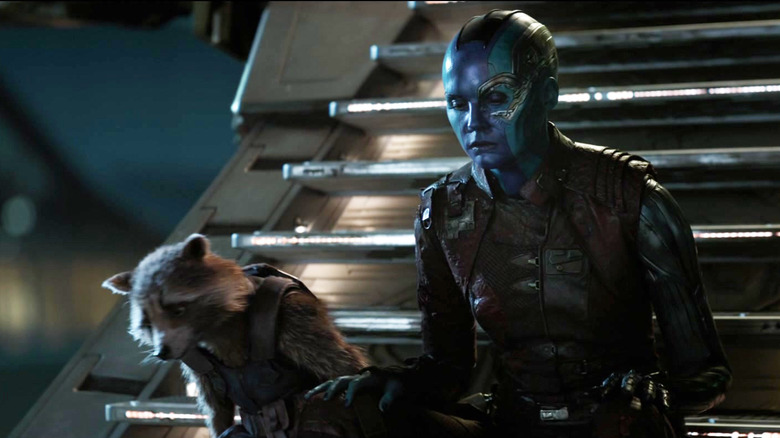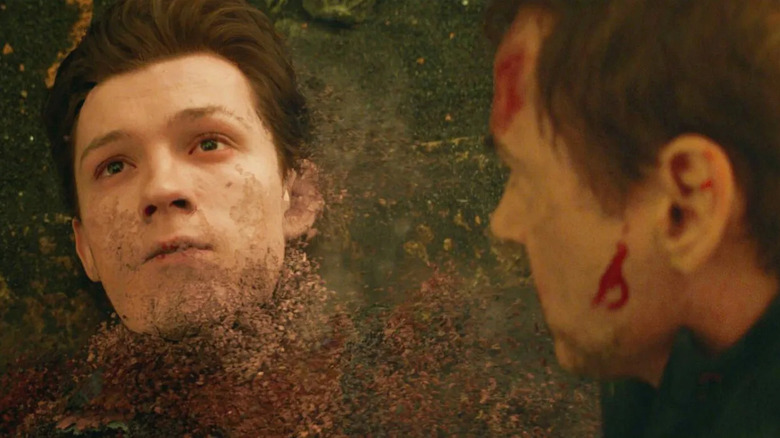Kevin Feige Worried 'The Blip' Would Ruin The MCU – Then There Was A Global Pandemic
"Avengers: Infinity War" remains a monumental piece of blockbuster filmmaking. It's the first half of a two-part culmination of a decade's worth of world- and franchise-building — one that brought together dozens of heroes for the kind of crossover event you could previously only find in comic books. The movie also ended with one of the events that came to define pop culture in 2018: The Blip, wherein half of the universe disappeared from existence.
That moment not only made "Avengers: Endgame" an instant must-watch for every person on the planet with a pulse but also created a big concern for the head of Marvel Studios. In the book "MCU: The Reign of Marvel Studios" by Joanna Robinson, Dave Gonzales, and Gavin Edwards, Marvel Studios head Kevin Feige recounts how he was worried The Blip would forever ruin the Marvel Cinematic Universe.
"I was wary of it becoming like the Battle of New York, which was the third act of 'Avengers,' which ended up being referenced as an event kind of constantly," Feige said. As dramatically effective as having Thanos (temporarily) kill off half of the MCU was, Feige worried that audiences would quickly move on and stop caring about the emotional repercussions of such a cataclysm ... at least, until a real-life pandemic happened. "This experience that affected every human on Earth now has a direct parallel between what people who live in the MCU had encountered and what all of us in the real world have encountered," Feige explained.
"Spider-Man: Far From Home" was the first MCU film to take place after The Blip, and it mostly took a comedic approach to the tragedy. (People reappearing on non-existing airplanes! A very funny tribute to the fallen Avengers!) The next time we got an MCU title, however, it was in the middle of the quarantine era of the pandemic.
A Thanos-size problem in the MCU
It's understandable that Feige was concerned about a world-defining event like The Blip getting forgotten as audiences turned their attention to the next phase of the MCU. That being said, it was the MCU itself that kind of forgot about The Blip the moment it happened. Sure, it was used for moments of great sorrow and trauma, but mostly in Disney+ shows like "WandaVision" and "The Falcon and the Winter Soldier."
Those series referenced and showed both the personal grief caused by The Blip and the global repercussions and social movements that erupted in its wake. When it came to the MCU's movies, "Ant-Man and the Wasp: Quantumania" similarly alluded to the homelessness that resulted from the Blip, along with the awkwardness of people being declared dead for five years before suddenly returning. Other than that, though, as time went on, it wasn't audiences that stopped caring about The Blip. It was the MCU itself that pushed it aside, save for a quick nod every once in a while and not much else.
Of course, that's nothing new for the franchise. Time and time again, huge world-changing events like the Sokovia Accords in "Captain America: Civil War," the giant Celestial popping out of the ocean in "Eternals," and the Earth-based colony of New Asgard introduced in "Endgame" are largely forgotten despite having dramatically changed things in the MCU. Now, as we approach yet another massive crossover event with "Avengers: Secret Wars" (one that could potentially even reboot the entire universe), it doesn't seem likely that the franchise will bring back many of its previous world-changing events to show how they've affected people.

